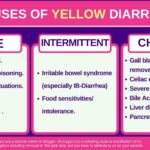Why Does My Poop Feel Sharp? 7 Causes Explained In-depth.
Our content is not intended nor recommended as a substitute for medical advice by your doctor. Use for informational purposes only.
The most common cause of sharp pain when you poo is often an anal fissure. Other causes include spicy foods, proctitis, and hemorrhoids.
The following are the common causes of feeling sharp pain when you poop:
- Anal fissure.
- Eating too much spicy food.
- Inflamed or thrombosed hemorrhoids.
- Severe (very frequent) or chronic (prolonged) diarrhea.
- Inflammatory bowel diseases such as ulcerative colitis and Crohn’s disease.
- Dysentery.
- Sexually transmitted diseases of the anus and the rectum.
- And others.
1 . Anal fissures.
Fissures are tears in the lining of the anal canal. They develop when there is severe stretch, trauma, or inflammation of the lining of the anal canal.
Unlike hemorrhoids, anal fissures are painful as your poop feels sharp during defecation.
Causes:
- Constipation (acute or chronic).
- Severe or prolonged diarrhea.
- After normal vaginal delivery.
- Any trauma to the anal or rectal area.
- It also can occur secondary to diseases such as ulcerative colitis and malignancy.
Symptoms:
- Sudden onset of sharp pain when you poop.
- The pain often lasts for minutes up to hours after defecation.
- The pain then partially or entirely resolves. But the sharp pain sensation recurs every time you have a bowel movement.
- Bright red blood on the surface of the stool.
- Most fissures heal within a few weeks. However, a smaller percentage of people may suffer from chronic fissures.
If you suspect the presence of an anal fissure, consult your doctor. Your doctor may need to perform a local examination to confirm the diagnosis (Rectal examination using a gloved finger).
Fissure treatment is based on treating the original cause (usually constipation). So, laxatives and stool softeners to prevent constipation are a must.
Also, topical medications will help ease the pain and relax the sphincter muscles.
2. Spicy foods.
Your anal canal and the perianal area are the only areas sensitive to irritation and pain.
Overeating spicy food can make your poop feel very sharp and painful.
Review what you ate in the previous hours or a couple of days before the onset of the burning sensation of stool.
Many foods such as peppers, chillis, and spicy fast foods will cause burning poop for a few bowel motions after eating.
Spicy foods may also cause:
- Abdominal cramps.
- Heartburn.
- Stomach (epigastric pain).
- Mild diarrhea.
However, The symptoms are temporary and mild. The sharp feeling of the poop often goes away within hours or a day.
3. Inflammed hemorrhoids.
Hemorrhoids (piles) are dilated and swollen veins in the wall of your anus and the lower part of the rectum.
Hemorrhoids are prevalent; nearly 3 out of 4 adults will have hemorrhoids at some point. However, most cases of hemorrhoids are asymptomatic or present with painless bleeding per rectum.
When the poop feels sharp (burning) in people with hemorrhoids, this may indicate inflammation of the hemorrhoids.
There are two types of hemorrhoids:
- External hemorrhoids: dilated veins in the last part of the anal canal and under the skin around the anus.
- Internal hemorrhoids: develops in the wall of the rectum.
Causes:
- Chronic constipation.
- Low-fiber diet.
- Sitting on the toilet and straining for a long period.
- Obesity, pregnancy, and anal intercourse are also risk factors.
Symptoms:
- Itching and irritation in the anal region.
- A sense of swelling around your anus (with external hemorrhoids).
- Non-inflamed hemorrhoids commonly present with bright red blood (mixed with stool or blood when you wipe).
- Continuous discomfort in the rectum and anal canal.
- Internal hemorrhoids may prolapse to the outside, causing a sense of mass, with a sharp feeling during poop.
- Inflamed, thrombosed hemorrhoids commonly cause sharp rectal pain, swelling, and a hard lump near your anus.
4. Severe diarrhea.
Severe diarrhea can be harmful to your rectum and anal canal lining.
Diarrhea speeds up the passage of food, acid, bile, and digestive enzymes through the intestine. As diarrhea becomes severe or prolonged, painful inflammation of the anal canal and the rectum is due to the passage of:
- Too much acid.
- Active digestive enzymes.
- Unprocessed bile.
Severe or prolonged diarrhea will make your poop feel sharp or burning.
Prolonged or chronic diarrhea may damage the rectal and anal lining, causing other health conditions such as anal fissures or piles.
A common cause of severe diarrhea includes:
- A severe attack of acute gastroenteritis (viral, bacterial, or protozoal.
- Severe Irritable bowel syndrome with predominant diarrhea.
- Celiac disease.
- Food intolerances.
- Inflammatory bowel disease.
5. Inflammatory Bowel disease.
Inflammatory bowel disease is a digestive system disease without a clear cause. It causes chronic inflammation, ulceration, and damage to the digestive tract.
It has two main distinct types:
- Ulcerative colitis: mainly affect the colon and the rectum.
- Crohn’s disease: affects any part of the digestive tract from the mouth to the anus.
Both disorders can cause inflammation and the rectum (proctitis) and anal canal ulceration.
Symptoms:
- Chronic abdominal pain.
- Irregular bowel habits (often diarrhea with mucus and blood).
- Tenesmus (persistent urge to poop with only mucus coming out).
- Sharp feeling with poop.
- Weight loss.
- Fever and sweating.
- Blood, mucus, or bloody mucus in stool.
- Constant fatigue and joint pains.
- Crohn’s disease may present with ulcers or abscesses around the anal area (perianal disease).
The disease is often diagnosed by endoscopy and biopsy. The disease is chronic and passes through periods of remission and flare-ups. Consult your doctor if you suspect IBD.
6. Dysentery.
Dysentery is an infection that mainly affects your rectum. It causes inflammation, pain, and a persistent urge to poop (tenesmus).
The main characteristic of dysentery is frequent diarrhea with blood and mucus.
Infections of your colon and the rectum cause it. The two main types of infections are:
- Shigella bacteria: causes (bacillary dysentery).
- Amoeba infections: it causes (amoebic dysentery). Amoebic dysentery is more common in tropical areas.
Dysentery causes inflammation of the rectum (proctitis), making your poop feel sharp or burning every time you go to the toilet.
Symptoms of dysentery include:
- Acute onset abdominal pain.
- Very frequent diarrhea with mucus, or mucus and blood.
- Tenesmus: the frequent urge to poop.
- Abdominal cramps.
- Fever.
- Nausea or vomiting.
7. Others.
- Sexually-transmitted diseases such as rectal gonorrhea or HPV.
- Severe IBS-diarrhea.
- Rectal or anal cancer.
- Solitary rectal ulcer syndrome.
- Perianal skin diseases.
- Radiation to the anal or rectal area.
- Perianal fistula.
- Evidence-based
- Written by a doctor.






